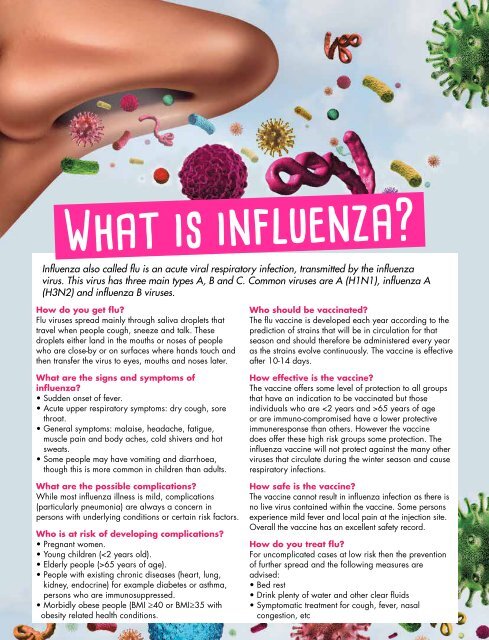Crawford Times 61
Create successful ePaper yourself
Turn your PDF publications into a flip-book with our unique Google optimized e-Paper software.
What is influenza?<br />
Influenza also called flu is an acute viral respiratory infection, transmitted by the influenza<br />
virus. This virus has three main types A, B and C. Common viruses are A (H1N1), influenza A<br />
(H3N2) and influenza B viruses.<br />
How do you get flu?<br />
Flu viruses spread mainly through saliva droplets that<br />
travel when people cough, sneeze and talk. These<br />
droplets either land in the mouths or noses of people<br />
who are close-by or on surfaces where hands touch and<br />
then transfer the virus to eyes, mouths and noses later.<br />
What are the signs and symptoms of<br />
influenza?<br />
• Sudden onset of fever.<br />
• Acute upper respiratory symptoms: dry cough, sore<br />
throat.<br />
• General symptoms: malaise, headache, fatigue,<br />
muscle pain and body aches, cold shivers and hot<br />
sweats.<br />
• Some people may have vomiting and diarrhoea,<br />
though this is more common in children than adults.<br />
What are the possible complications?<br />
While most influenza illness is mild, complications<br />
(particularly pneumonia) are always a concern in<br />
persons with underlying conditions or certain risk factors.<br />
Who is at risk of developing complications?<br />
• Pregnant women.<br />
• Young children (65 years of age).<br />
• People with existing chronic diseases (heart, lung,<br />
kidney, endocrine) for example diabetes or asthma,<br />
persons who are immunosuppressed.<br />
•Morbidly obese people (BMI ≥40 or BMI≥35 with<br />
obesity related health conditions.<br />
Who should be vaccinated?<br />
The flu vaccine is developed each year according to the<br />
prediction of strains that will be in circulation for that<br />
season and should therefore be administered every year<br />
as the strains evolve continuously. The vaccine is effective<br />
after 10-14 days.<br />
How effective is the vaccine?<br />
The vaccine offers some level of protection to all groups<br />
that have an indication to be vaccinated but those<br />
individuals who are 65 years of age<br />
or are immuno-compromised have a lower protective<br />
immuneresponse than others. However the vaccine<br />
does offer these high risk groups some protection. The<br />
influenza vaccine will not protect against the many other<br />
viruses that circulate during the winter season and cause<br />
respiratory infections.<br />
How safe is the vaccine?<br />
The vaccine cannot result in influenza infection as there is<br />
no live virus contained within the vaccine. Some persons<br />
experience mild fever and local pain at the injection site.<br />
Overall the vaccine has an excellent safety record.<br />
How do you treat flu?<br />
For uncomplicated cases at low risk then the prevention<br />
of further spread and the following measures are<br />
advised:<br />
• Bed rest<br />
• Drink plenty of water and other clear fluids<br />
• Symptomatic treatment for cough, fever, nasal<br />
congestion, etc

















